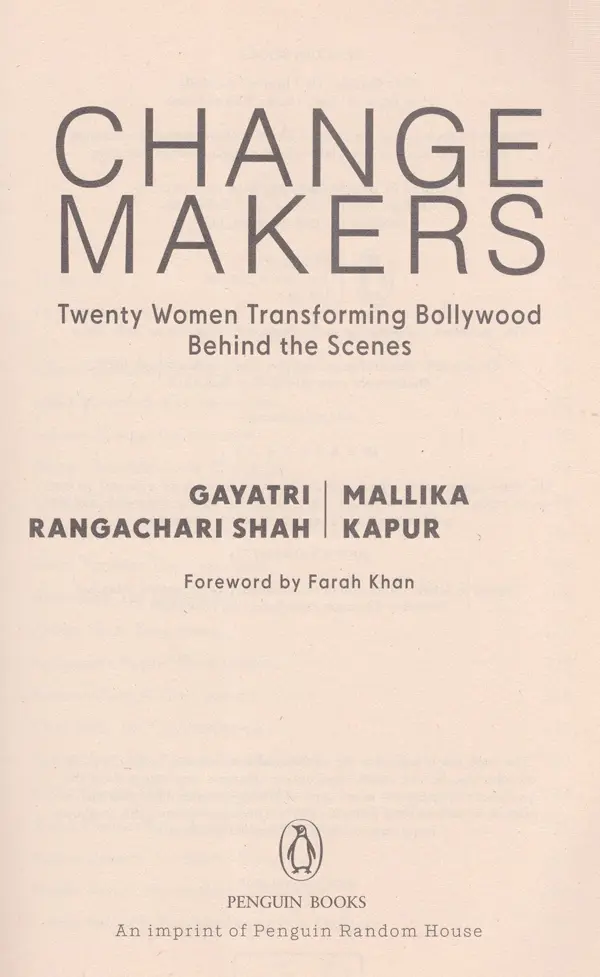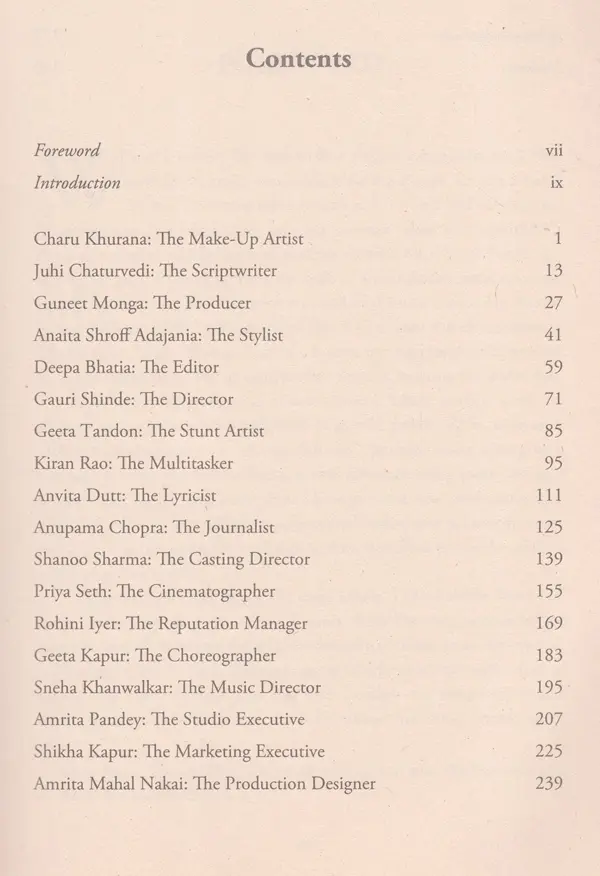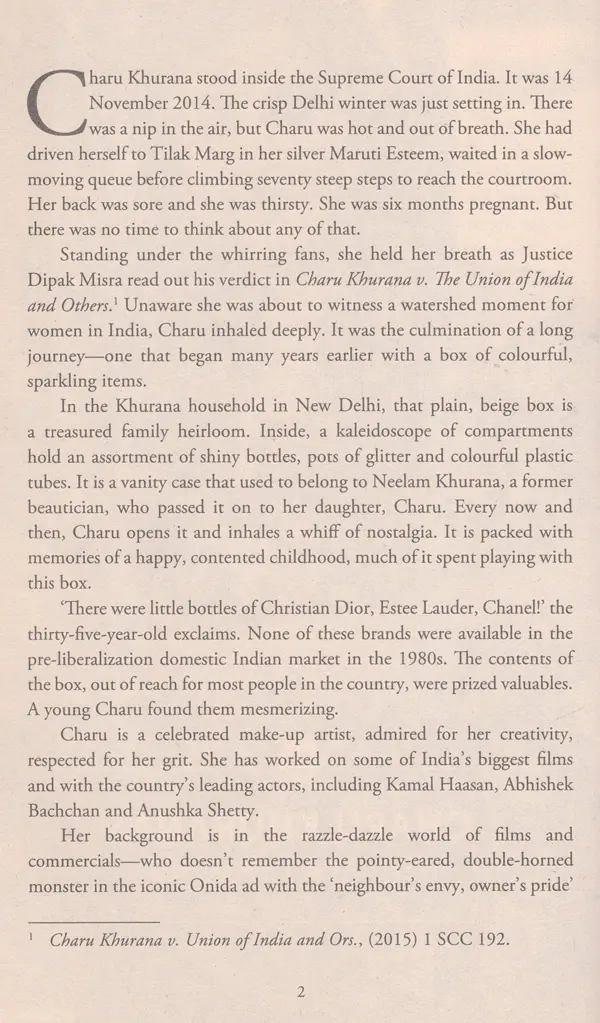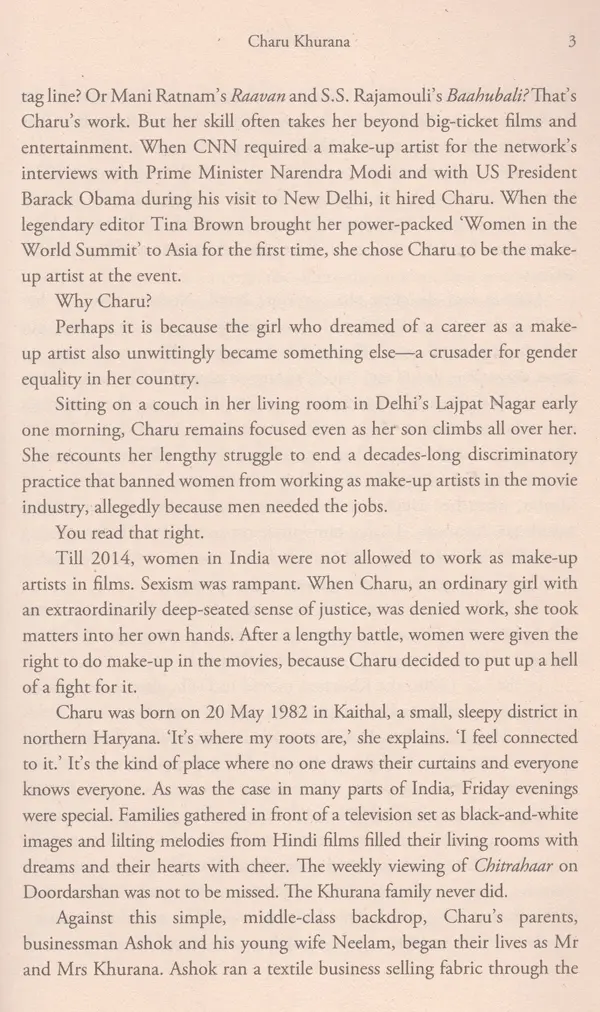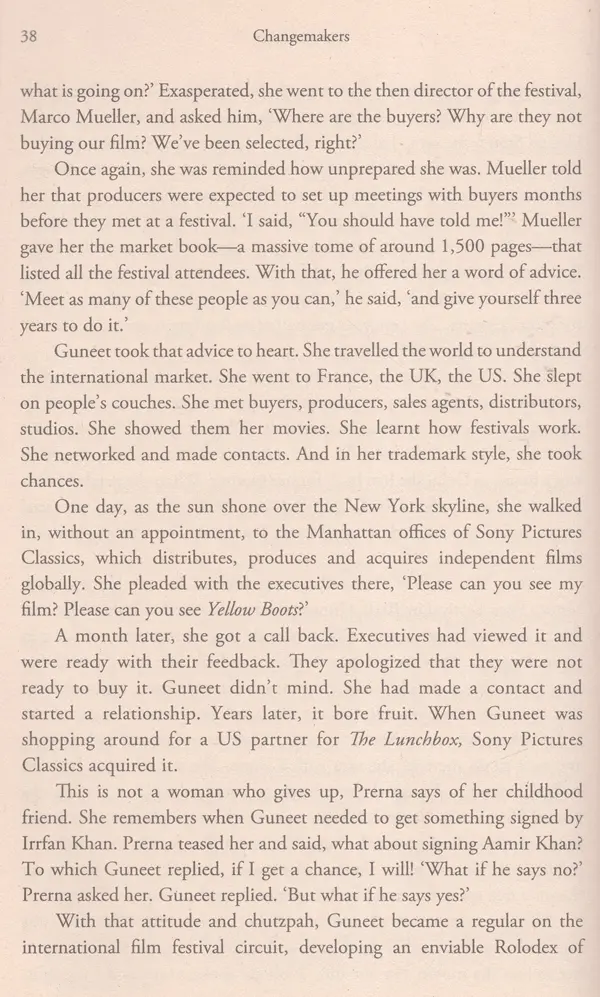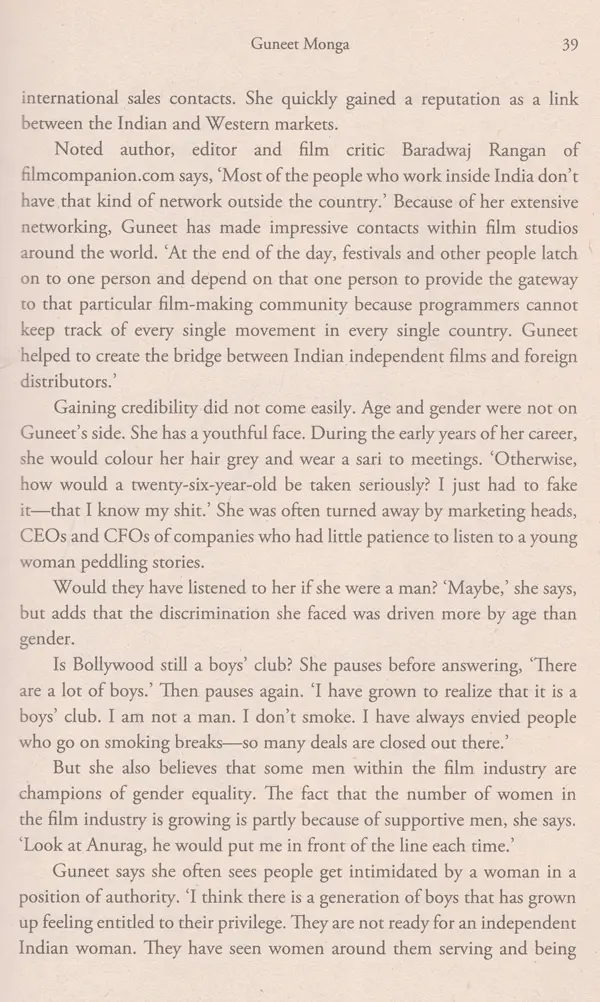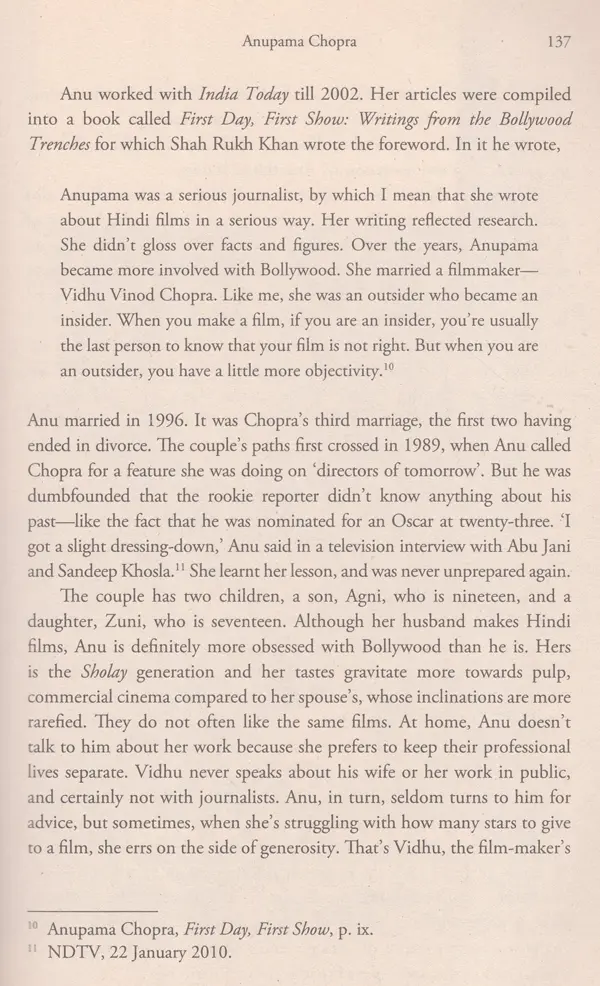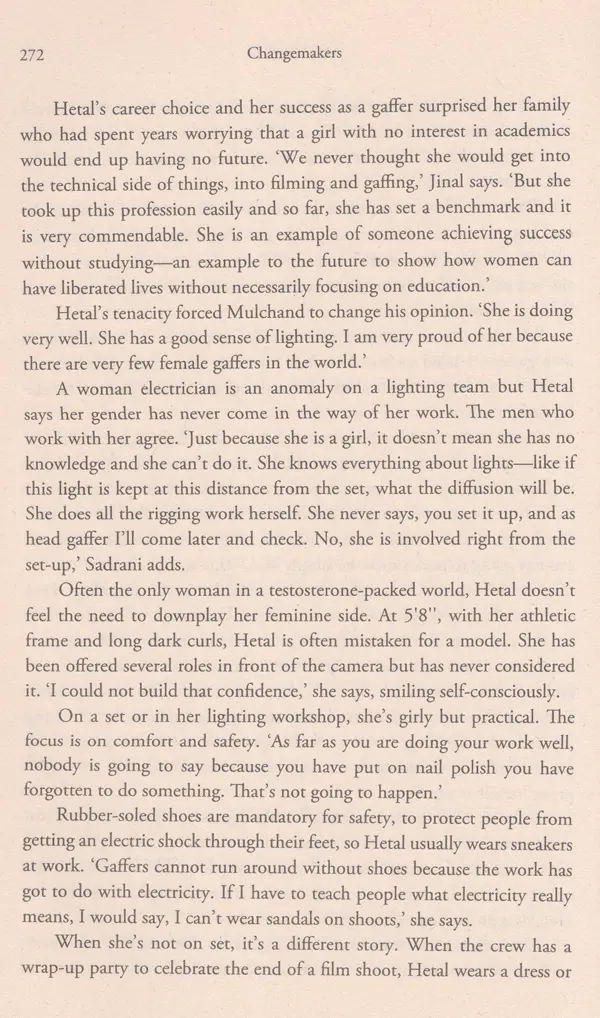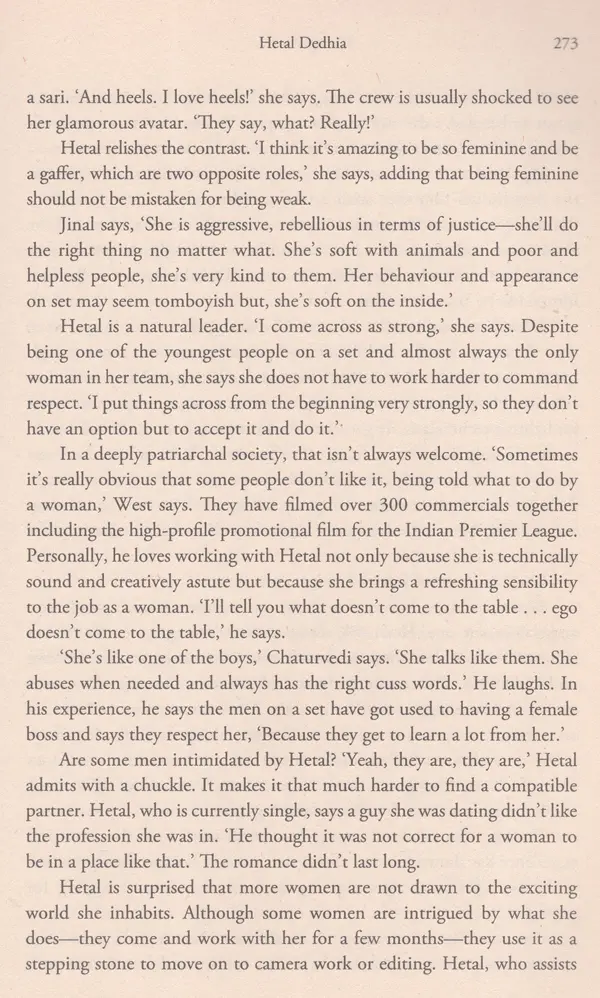
Change Makers: Twenty Women Transforming Bollywood Behind the Scenes
Book Specification
| Item Code: | UBE975 |
| Author: | Gayatri Rangachari Shah & Mallika Kapur |
| Publisher: | Penguin Random House India Pvt. Ltd. |
| Language: | English |
| Edition: | 2018 |
| ISBN: | 9780143441731 |
| Pages: | 311 |
| Cover: | PAPERBACK |
| Other Details | 8.50 X 5.50 inch |
| Weight | 260 gm |
Book Description
Since Bollywood's earliest days, women have played a part in its success, both in front of the camera and away from it. Yet it has taken more than half a century for women to assert their presence in significant numbers in Bollywood. Today, Hindi cinema relies on a record number of women who work tirelessly, sometimes invisibly, to keep the world's largest dream factory buzzing.
This book tells the story of twenty incredible women, many with no prior connections in the industry, who have carved successful careers despite significant challenges. They often work away from the public gaze-as studio heads, producers, directors, make-up artists, stylists, script writers, lyricists,editors, choreographers, stunt artists, set designers, and in the many other jobs that support the making of a movie. These women deserve to be applauded and their journeys acknowledged, as they transform Bollywood and in the process, create a new India..
Gayatri Rangachari Shah is a journalist and columnist whose work has appeared in both national and international publications like the New York Times. She has a fortnightly column, 'Flight of Fancy', in The Hindu. She is a contributing editor at Vogue and Architectural Digest and India head at Tina Brown Live Media, which produces the globally renowned journalism summit Women in the World. Gayatri covers a variety of subjects, including culture, gender, design and education, and has profiled leading personalities around the world. She is a graduate of Mount Holyoke College and Columbia University's Graduate School of Journalism. She lives in Mumbai with her husband and two children.
Mallika Kapur is an international news journalist. She is currently a senior editor at Bloomberg Live, APAC. In her twenty-year career that spans three countries, she has been a producer, anchor and correspondent for CNN in London, Mumbai and Hong Kong. She has reported extensively on key economic, political, social and gender issues in India and covered some of Asia's biggest breaking news stories for the network. She has also anchored business news shows and hosted long-form feature programmes. Mallika attended Brown University and Columbia University's Graduate School of Journalism. She resides in Hong Kong with her husband and two children.
When I joined the Hindi film industry in the early 1990s. very few women worked behind the scenes. I started out as a fourth assistant director and was the only girl on set. apart from the stars. The few other women one saw were the hairdressers. Even the costume designers and make-up artists were men. People did not really want their daughters to work in the industry because it was largely male-dominated. We took a photo of the unit on the last day we filmed Jo Jeeta Wohi Sikander, for which I had done the choreography. That was in 1992. That picture is an accurate portrayal of the times. In a crew of seventy-five to eighty men, there is just one woman-me From the earliest days of Hindi cinema, when women were not allowed to act in movies-men wore wigs and dressed up as women to play female characters-to the present day, we have come a long way. Corporates have entered the business and there are many more educated people working in films now. That's brought in a new professionalism. The film industry is considered 'respectable' today, and because it is also lucrative, it is attracting talented men and women from across the country and around the world.
Things started changing in the early 2000s. I think Main Hoon Na broke some kind of glass ceiling. I don't think that was acknowledged enough, though. It was unheard of for a woman to direct an action-packed. big-budget commercial Bollywood movie that went on to make crores of rupees. Till then, women were put into a niche-we were supposed to make 'sensitive' movies about 'sensitive' issues, that small movie about a couple that can't have children that would run as a morning show at a multiplex.
With Main Hoon Na, I became one of the few women to direct a mainstream entertainer. Today, there are several women directors. Perhaps not all are famous, but they are there. Now, units are full of women. In twenty-five years, the scene has changed dramatically.
On films Happy New Year and Om Shanti Om, 50 per cent of my my crew comprised women. I want to be clear that I do not choose a person because she is a woman, nor am I suggesting that anyone should p get a job because of their gender. I choose the best person for the job, that they happen to be women is a great thing.
I would like men to read this book and realize that the women who work with them, and for them, go through a lot, and that they work much harder to get half the appreciation as men. Men take that for granted. I see male directors and I am amazed at their sense of entitlement and arrogance. Women tend to downplay their achievements. People would be surprised to know that even I have low self-esteem. I never talk about how many hits I have delivered and that nobody can push me around. Women don't speak like that..
I am delighted that Gayatri and Mallika have chosen to shine a light on the women who toil behind the scenes in this industry day in and day out. After reading their stories, I know you will applaud them. Gayatri and Mallika have profiled a solid list of women, many of whom I know and respect. Each one of them is an outstanding example of how hard work and living on your own terms pay off. I hope this book will inspire young women around the country to choose to work in films and make the industry even more dynamic.
This book is about women in Bollywood. But it is not about those in the public gaze. The lives and loves, films and careers of actors are well chronicled. What about those women who work away from the limelight, behind the scenes of the Hindi film industry? You have most likely seen their work but often don't know it. And you probably aren't familiar with their names. They belong to a Bollywood we know little about. .
Two decades into the twenty-first century, India is experiencing a seismic societal churn. Women have never been better educated, earned more or lived healthier lives. From boardrooms to courtrooms, factory floors to software centres, in sports, in the arts and in science, they have made great strides. .
Yet, Indian women continue to encounter significant hurdles in the form of systemic oppression and deep-rooted cultural biases. The gender ratio is grossly imbalanced: India has 37 million more men than women, according to the 2011 census. Women remain physically vulnerable. The wage gap is a pressing problem. And despite a growing economy their numbers in the workforce are declining. A 2017 World Bank report says that only 27 per cent of Indian women are employed. Against this paradox, one industry presents an intriguing picture: .
Bollywood. Although the odds remain stacked against women in this field too-the gender ratio in India's film industry is 6.2 men to every woman, according to a report by the Geena Davis Institute on Gender in Media-the past two decades have seen a record number of women work behind the scenes of Hindi cinema.
Book's Contents and Sample Pages
